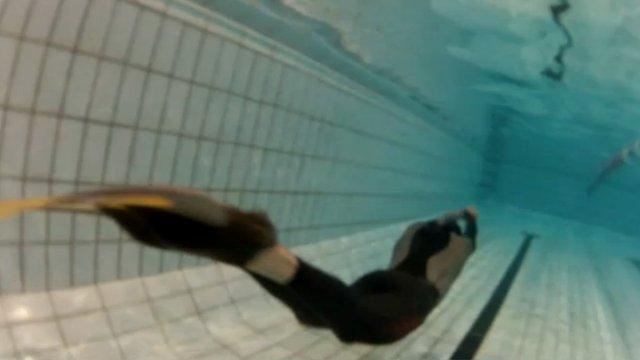The Deepest Breath: 'Nerve-shredding' documentary explores perils of freediving
- Published
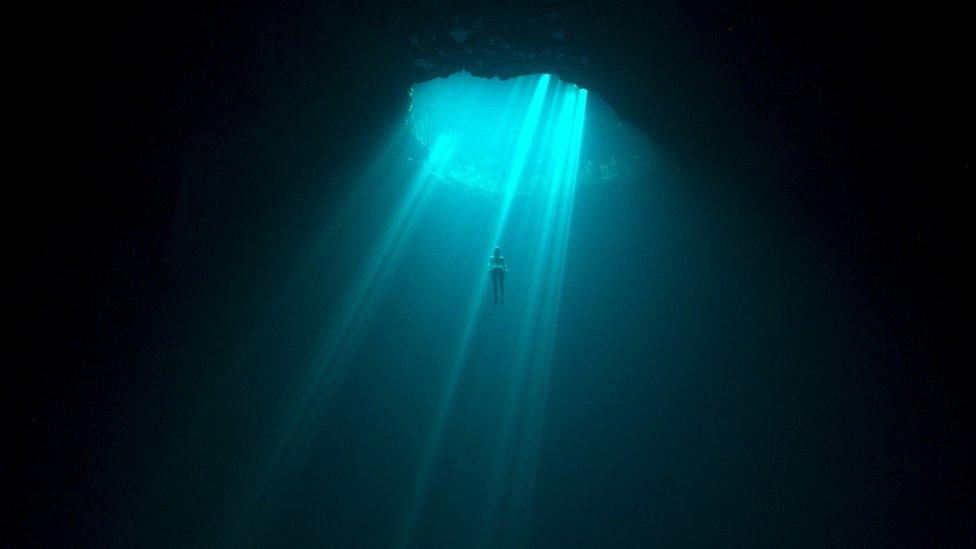
The film shows freedivers attempting Egypt's notorious Blue Hole dive
Holding your breath is something most of us do to get rid of hiccups, so diving over 100 metres into the ocean's depths, without breathing, could be the stuff of nightmares.
The Deepest Breath is a documentary which explores this - the sport of freediving.
It gives the audience a close-up view of the swimmers who compete against each other by diving down into the ocean on just a single gulp of air.
"It's very simple. The deepest dive wins," says the film's trailer. "You've gotta swim the length of a 70-storey skyscraper."
But it adds ominously: "Freediving is an extreme sport - and extreme sports have extreme consequences."
The most dangerous part of the dive is when the swimmer returns to the surface, when they can succumb to so-called "shallow water blackout" just metres from fresh air.
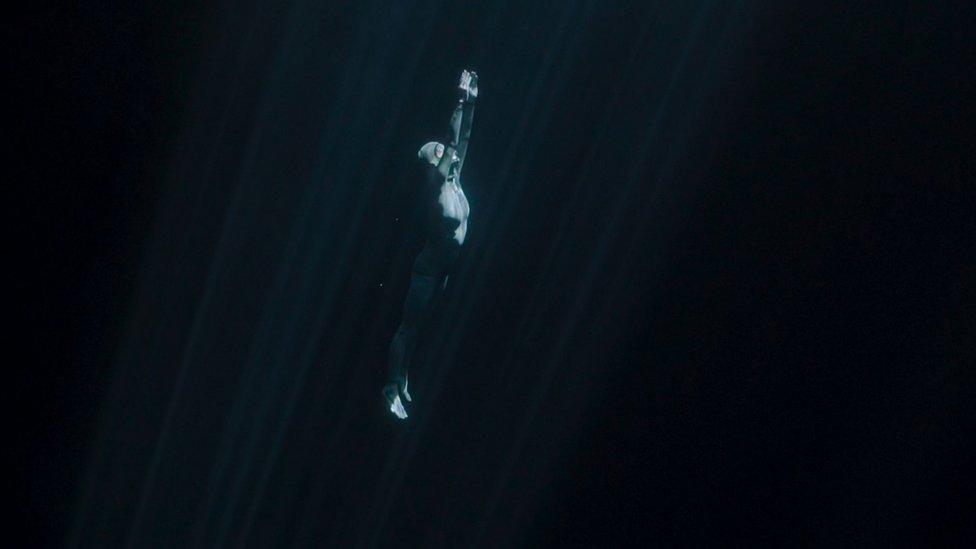
The ascent is more dangerous than the descent in freediving
It's disturbing seeing footage of swimmers blacking out and being pulled out of the water by the safety divers, who sometimes have to revive them with mouth-to-mouth resuscitation.
The safety diver meets the swimmer as they ascend, watching them closely, primed to pull them upwards if they start to lose consciousness.
No-one is immune from freediving's dangers, and the film has some heart-stopping moments. You get the sense that something terrible could happen at any time.
We are told about champion freediver Natalia Molchanova, presumed dead after diving in Ibiza in 2015. She sadly didn't resurface after a recreational dive, and it's believed she was caught in underwater currents.
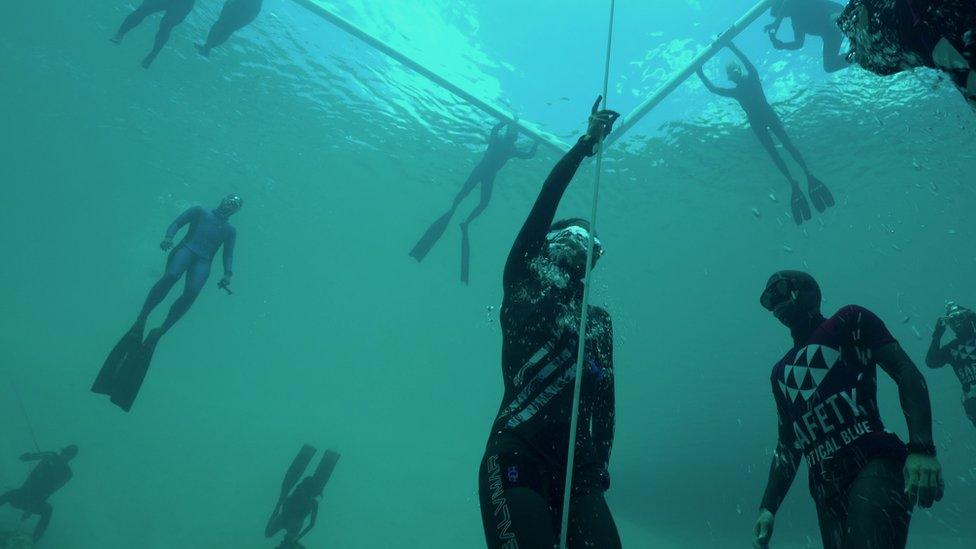
Safety divers are crucial to the survival of freedivers as they come up for air
The Deepest Breath's director Laura McGann became "hooked" on making the film after her interest was sparked by a news story about Irish freediver Stephen Keenan.
"I didn't know anything about freediving. I love the sea and go swimming all year round," McGann says at June's Sheffield Documentary Festival.
"I started to look online and saw beautiful videos and short films about freedivers, and it made me feel something I had really never felt before."
McGann wanted to explore how the intrepid Keenan fell in love with diving, while he was living in Dahab, Egypt. He became an instructor and safety freediver - one of the experienced divers on hand to help during freediving competitions.
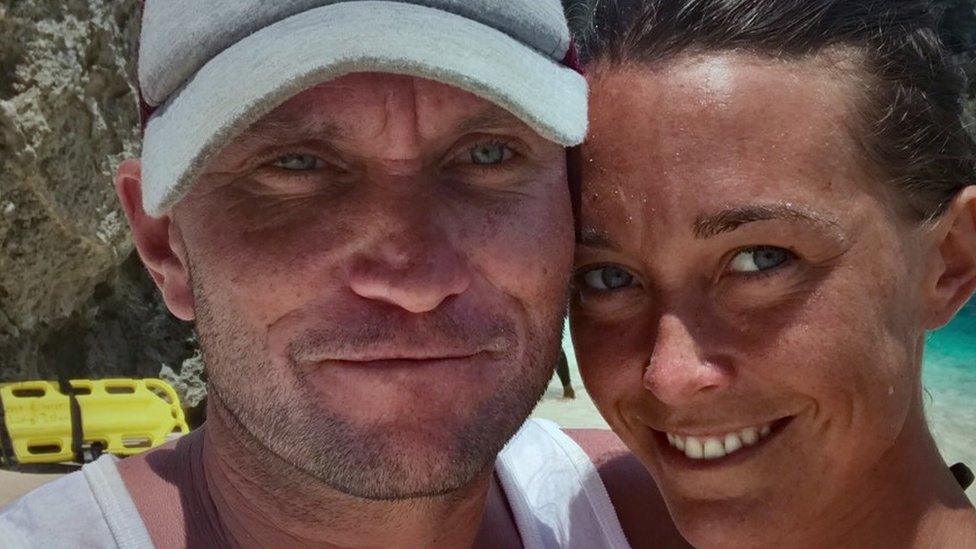
Stephen Keenan and Alessia Zecchini: The film shows how their relationship grew through their love of diving
She was also very interested in how he worked with Italian freediver Alessia Zecchini in her bid to become a world champion, making her childhood dream a reality.
Their relationship deepens throughout the film, which takes the viewer on an emotional journey.
McGann also talks about what it feels like to watch freediving footage.
While it's undoubtedly beautiful to see someone descend silently into the ocean's depths, watching the film does make you very aware of your own ability to inhale.
McGann says the same happened to her.
"I was doing what many of you may have done in the first couple of minutes of this film - I was holding my breath, to try to figure out 'how are they doing this?'" she adds.
"I counted how many times I'd have to let go of the breath and breathe in."
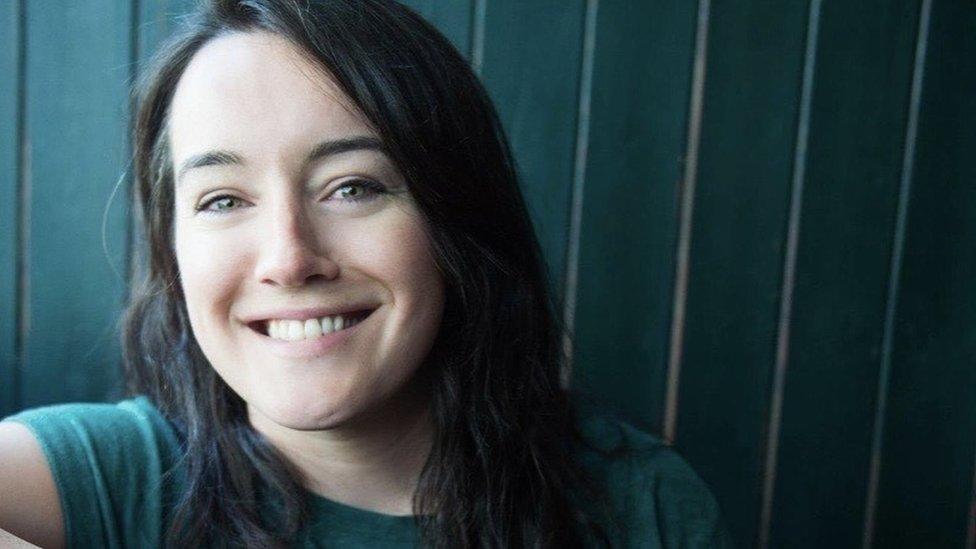
Laura McGann: Freediving footage "made me feel something I had really never felt before"
The director's research for her film began in lockdown, during the Coronavirus pandemic.
"I started to speak to people, and to learn more about Stephen and Alessia," she says, revealing her surprise when she realised she lived close to Stephen's Dad, Peter, in Ireland.
Peter gave her 14 hours of audio interviews with his son, which McGann was able to listen to, and use for the film.
"I fell in love with Steven and gradually got to know Alessia more, it was just an instant connection that I felt, with the story," McGann explains.
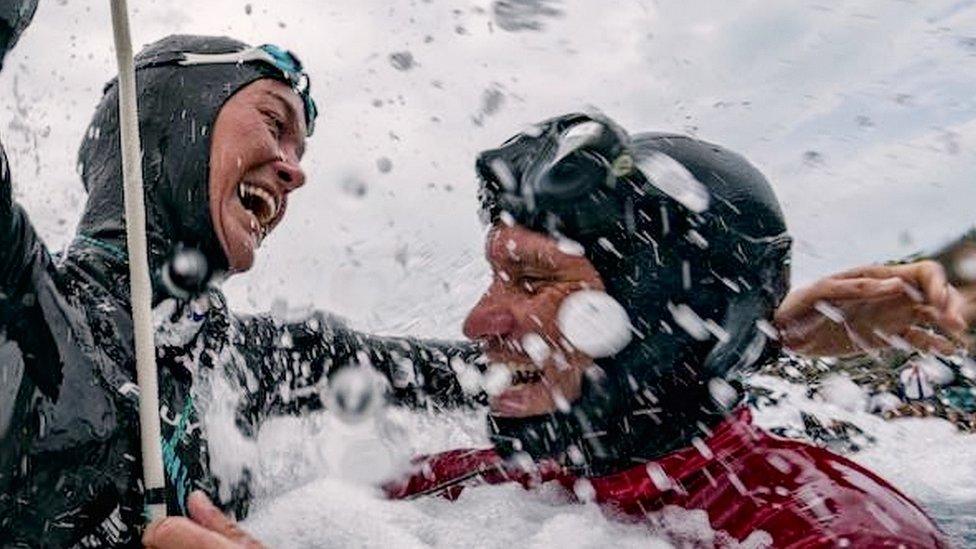
Alessia Zecchini and Stephen Keenan are seen celebrating after one of her diving successes
The film uses actual footage and some reconstruction to tell Zecchini and Keenan's story, as they build up to her attempt to set a new world freediving record.
Zecchini has to master her mind as well as her body, learning to meditate and calm her thoughts before she enters the water.
We also see them at Dahab's notorious Blue Hole in Egypt, which has a terrifying-looking 25m-long tunnel, 55m below the Red Sea. It is nicknamed the "divers' cemetery", external.
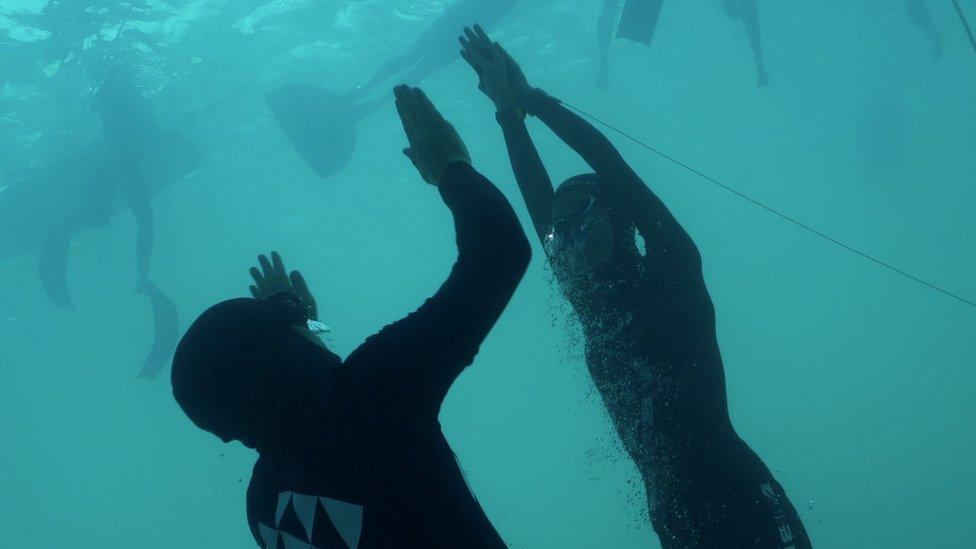
Stephen Keenan and Alessia Zecchini are seen working on her technique
McGann wasn't there at the time, but she tells their story chronologically, using footage from the diving community, who documented events on a variety of cameras.
She explains that in order to film someone freediving, the camera person also needs to be a freediver, to "come up at their speed", and capture the whole dive on film.
"It was important it was real, it was raw, so there were images there shot on a GoPro camera, on 4K… on an iPhone," she says.
"You wouldn't [usually] use that, but it's [recorded] the moment - so you put it in."
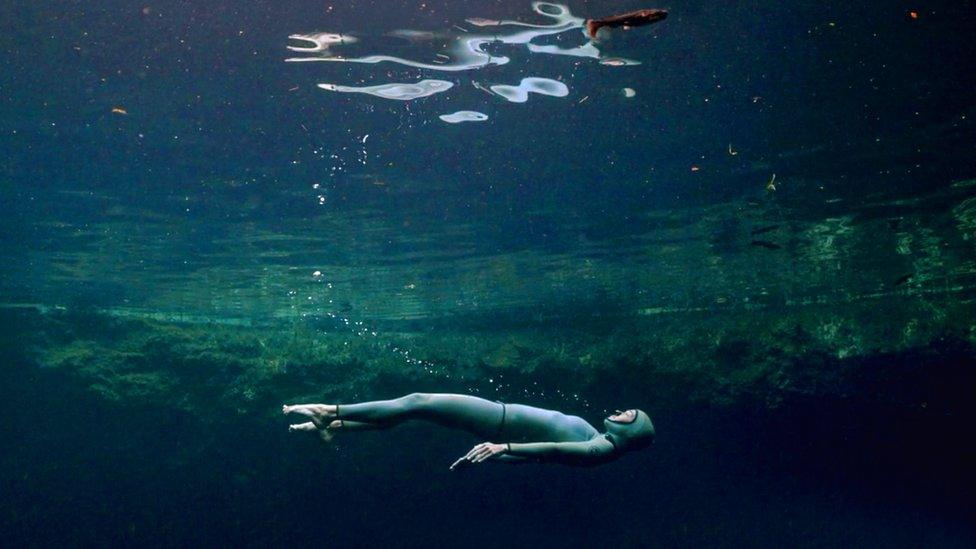
Alessia Zecchini's love of water is very evident in the film
McGann tells the BBC it was hard at times to stay detached, given how close she felt to her subjects.
"You certainly don't stay detached, you fall in love with the story, the people in it," she says. "But it's important to be able to recognise that, and recognise you have a role here - to best tell the story."
She adds that the documentary did not gloss over any negative aspects of its participants' behaviour.
"Alessia doesn't always behave wonderfully… and it was a little bit awkward, but... she watched it, she accepted it."
Producer Sarah Thomson adds: "It's to Laura's credit that she has such intimate relationships with the people that you see, and was able to get them to sit down for interviews."
She says they have also hosted special screenings with the freediving community to "give them a chance to see this together".
Freediver Adam Drzazga reveals the training and relaxation exercises required to hold his breath for more than six minutes
The film has been well received, having been screened at Sundance Film Festival in January.
Screen Daily's Fionnuala Halligan wrote, external back in March: "The Deepest Breath is a nerve-shredding experience. McGann's astute assemblage captures the liquid danger of the dark depths.... Awards will surely come calling.
"Technically, it's just about flawless. Although The Deepest Breath is due for release on Netflix later on this year, it's one of the ultimate big-screen experiences that is worth seeking out should the chance arise."
Guy Lodge from Variety added, external: "The world can probably be divided into two camps of people: those who will watch The Deepest Breath, a heart-pumping documentary on the extreme sport of freediving, and understand the dangerous pull of the big blue, and those for whom it might be the most nightmarish vicarious trip into the ocean since Jaws."
Allow YouTube content?
This article contains content provided by Google YouTube. We ask for your permission before anything is loaded, as they may be using cookies and other technologies. You may want to read Google’s cookie policy, external and privacy policy, external before accepting. To view this content choose ‘accept and continue’.
Daniel Feinberg in The Hollywood Reporter , externalcalled the film a "heart-stopping plunge into a fathomless obsession", adding: "In the most literal sense, the film is a breath-taking documentary, one filled with eye-popping visuals, thrilling competitions and a deftly presented love story."
McGann hopes that people seeing it will engage with "Alessia and Stephen's bravery... and gorgeous curiosity that they maintained into their adult lives, which you don't see very often".
She adds: "They followed their gut, even though it wasn't what was expected of them - you never know where it's gonna bring you."
The Deepest Breath is released for one week at Curzon Camden cinema, London, on 14 July, and is released in 155 countries on Netflix on 19 July.
Related topics
- Published5 August 2015
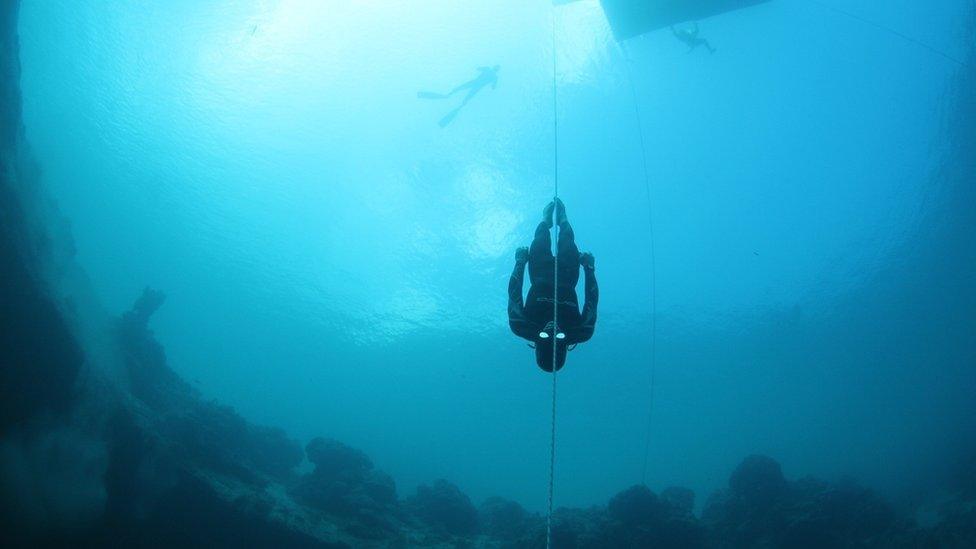
- Published13 June 2013
